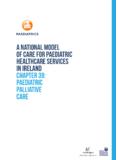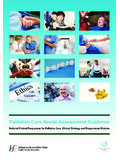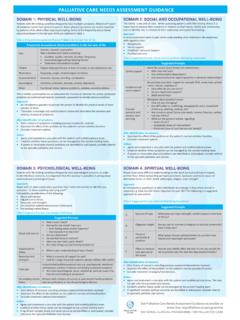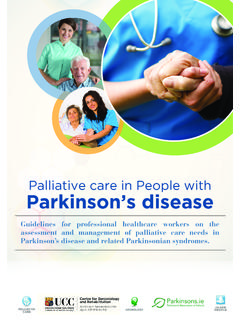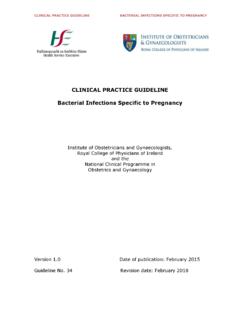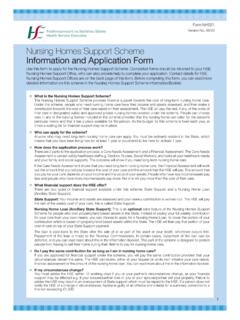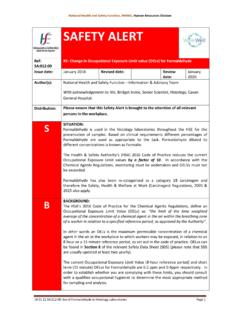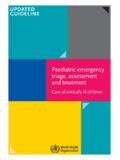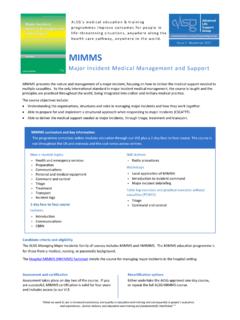Transcription of TURNING PATIENTS INTO PARTNERS - hse.ie
1 PATIENTCSPD BULLETIN2018 SPRING EDITIONSPRING BULLETIN 2018 PUTTING THE PATIENT INTO PERSON-CENTRED CAREP atients / service users cannot just be story tellers in the co-production process. They need to be involved in the PATIENTS INTOWHAT PATIENTS WANT care FOR ME care I AM CONFIDENT IN care IN MY JOURNEY THROUGH HEALTHCAREPARTNERSN ational Clinical& Integrated care ProgrammesPerson-centred, co-ordinated careISSUE 1 // APRIL 2018I would like to express my gratitude to all healthcare staff for helping us to progress towards our joint vision of delivering person-centred, coordinated care . Our main goal is to rethink the delivery of health and social care to improve and standardise patient care across all healthcare settings, irrespective of location, by bringing together clinical disciplines and enabling them to share innovative, evidence-based solutions in the interest of leading improvements in patient focused National Clinical and Integrated care Programmes continue to work with service users, carers, medical colleges, nursing, and health and social care professionals to develop and implement processes and solutions that will improve the way in which care is provided.
2 We are delighted to announce the completion of new Models of care over the last 15 months, in areas such as Rehabilitation Medicine, Rheumatic and Musculoskeletal Disorders, Type 2 Diabetes and Mental Health, as well as introducing a wide range of guidelines, pathways and supporting documents. CSPD, in pursuance of the HSE goal to build a better health service for everyone in Ireland, has taken the lead in TURNING PATIENTS into PARTNERS . To achieve this, we need to know what PATIENTS and service users expect to know what matters most to them. Through the implementation of Your Voice Matters , a readily available patient focussed online survey, we will constantly have service user feedback helping us to enhance our services, influence how we make decisions, and improve services over time.
3 We would love to hear from you, so please do not hesitate to send us your feedback or suggestions at more information follow @ CSPD_HSE on Twitter or visit the CSPD ine CarrollNational Director, Clinical Strategy & ProgrammesDivisionIMPLEMENTING THE NATIONAL CLINICAL AND INTEGRATED care PROGRAMMESCSPD BULLETINThe National Clinical and Integrated care programmes have embarked on a long term programme of work to clinically redesign the delivery of health and social care services to improve and standardise patient care across all healthcare Models of care have been designed for: Specialist Geriatric Services - Part 2: Mental Health Service Provision Specialist Rehabilitation Services in Ireland Rheumatic and Musculoskeletal Disorders Integrated care for PATIENTS with Type 2 Diabetes Eating Disorder Services Transition from Paediatric to Adult Healthcare Providers in Rare Diseases2.
4 A number of guidelines, pathways, practice guides and clinical decision tools have been developed including: Bereavement care following Maternal Death within a Hospital Setting Investigation and Management of Ovarian Cysts in Post-Menopausal Women Management of Breech Presentation Medication Guidelines for Obstetrics and Gynaecology Volume 1: Antimicrobial Prescribing Guidelines Medication Guidelines for Obstetrics and Gynaecology Volume 2: Antimicrobial Safety in Pregnancy and Lactation Minimum Standards for Acute Surgical Assessment Units Revised Practice Guide for the Management of Women with Epilepsy Swallow Screening in Stroke Use of Parenteral Nutrition in Neonatal and Paediatric Units Integrated care Pathway for the Management of Spinal Cord Injury Rapid Discharge Pathway for PATIENTS Who Wish to Die at Home care and Management of a Central Venous Access Device for a Child in the Community A Maternity Sepsis Support Tool National Quality Assurance & Improvement System (NQAIS)
5 Clinical Database Tool for Acute HospitalsNational Clinical& Integrated care ProgrammesPerson-centred, co-ordinated careISSUE 1 // APRIL 2018 INTEGRATED care PROGRAMMESCSPD BULLETINI ntegrated care is providing person-centred, coordinated, seamless care and support, when and where needed and as close to home as possible, to improve quality and put patient outcomes and experiences at the heart of everything we do. Examples of Advances in care in progress:#OurHealthServiceNational Clinical& Integrated care ProgrammesPerson-centred, co-ordinated careThe piloting of Heart Failure Virtual Clinic consultations has resulted in an estimated 83% reduction in referrals to Cardiology Outpatients or Emergency Departments for the PATIENTS reviewed, enhancing their healthcare experience and reducing the need for unnecessary mid 2016 and end 2017, new multidisciplinary Integrated care teams were established in 12 pioneer sites across the country.
6 These teams travelled to see 48% of PATIENTS in their own home and 30% in a day clinic within 24 hours of average, the teams discharged 88% of PATIENTS to a home setting with community support, avoiding the need for hospital 2017, four sonographers were assigned to four pilot hospital sites to screen new born babies at high risk of Developmental Dysplasia of the Hip (DDH).As a result, approximately 2,100 babies will be screened annually. Early diagnosis can help to avoid impaired hip function and premature degenerative joint care Programme for ChildrenIntegrated care Programme for Prevention and Management of Chronic DiseaseIntegrated care Programme for Older PersonsIntegrated care Programme for Prevention and Management of Chronic Disease and the National Clinical Programme for Heart FailureISSUE 1 // APRIL 2018 INTEGRATED care PROGRAMMESCSPD BULLETINE xamples of Advances in care in progress:National Clinical& Integrated care ProgrammesPerson-centred, co-ordinated careIn 2017, 8 Clinical Nurse Specialists from Respiratory Integrated care teams, engaged with 54 General Practices in a pilot scheme.
7 This resulted in PATIENTS having better access to asthma/COPD review, individualised care plans and pulmonary assessment outside of the hospital September and October 2017, implementation of the Theatre Quality Improvement Programme at University Hospital Kerry has seen the number of PATIENTS at risk of post-surgery hypothermia drop from 47% to 0%, improving patient experience and 2017, 2,400 GP practice visits were carried out by Clinical Nurse Specialists from Diabetes Integrated care Teams reviewing approximately 11,600 PATIENTS . These nurses serve as an integrating force between Primary and Secondary care , allowing PATIENTS with more complicated diabetes to be managed in the community close to their homes and improving their quality of Galway University Hospital in 2017, the piloting of the National Patient Flow Improvement Programme resulted in a 50% reduction in emergency theatre waiting time, releasing 2.
8 255 bed days into the care Programme for Prevention and Management of Chronic DiseaseIntegrated care Programme for Prevention and Management of Chronic DiseaseIntegrated care Programme for Patient FlowIntegrated care Programme for Patient Flow#OurHealthServiceISSUE 1 // APRIL 2018 NATIONAL CLINICAL PROGRAMMESCSPD BULLETINThe National Clinical Programmes and supporting initiatives have been one of the most significant developments in the Irish health service. They continue to change how care is delivered using evidence-based approaches to improvement. Examples of Advances in care in progress:#OurHealthServiceNational Clinical& Integrated care ProgrammesPerson-centred, co-ordinated careBetween 2016 and 2017, over 190,000 PATIENTS were cared for under the National Acute Medicine Programme pathway.
9 63% were treated and discharged from an acute hospital unit to an appropriate care setting close to home within 6 2014 and 2017, 65 additional hospice beds were opened across four sites, providing PATIENTS and families with 24/7 specialist palliative care from a comprehensive, interdisciplinary team of 2017, 25 new Community Palliative care Nurse posts provided support closer to the patient s preferred place of care , as close to home as of the National Acute Medicine Programme (NAMP) pathway has reduced the average length of stay in hospital for acute medical PATIENTS from days in 2010 to days in 2017, increasing inpatient bed healthcare workers took part in a new Palliative care Needs Assessment Education Programme in 2017, helping to ensure recognition and assessment of patient and families palliative care needs in all care Clinical Programme for Acute MedicineNational Clinical Programme for Palliative CareNational Clinical Programme for Palliative CareNational Clinical Programme for Acute MedicineNational Clinical Programme for Emergency MedicineNational Clinical Programme for Palliative Care83% of Emergency Departments have adopted a safer.
10 Improved Ambulance Handover Protocol. This is standardising handovers between prehospital and hospital staff, resulting in improved patient experiences and safety through interdisciplinary 1 // APRIL 2018 NATIONAL CLINICAL PROGRAMMESISSUE 1 // APRIL 2018 CSPD BULLETINA dvances in care in progress:National Clinical& Integrated care ProgrammesPerson-centred, co-ordinated care #OurHealthServiceBetween 2008 and 2015, the number of Acute Stroke Units (ASUs) in Irish hospitals grew from 1 to 22 with Clinical Stroke Leads increasing from 12 to 23, significantly improving access to quality care for Stroke a result of the National Musculoskeletal Physiotherapy Triage Initiative, across 18 sites nationally, PATIENTS with musculoskeletal complaints can now access expert outpatient assessment up to quicker than 2014 and 2016, the number of people treated by Primary Percutaneous Coronary Intervention (PPCI)
